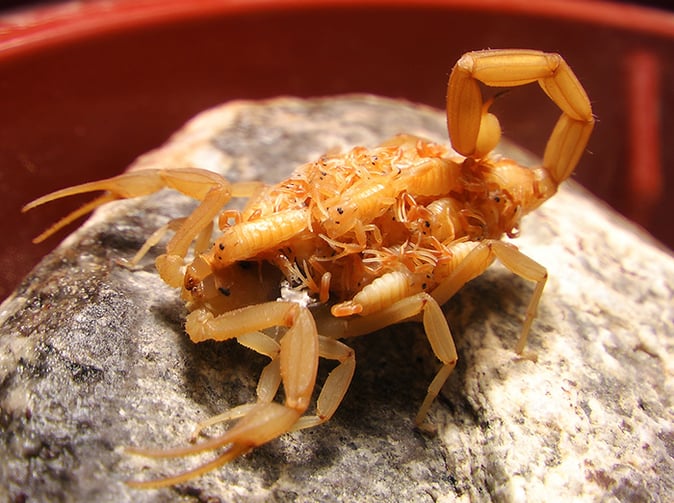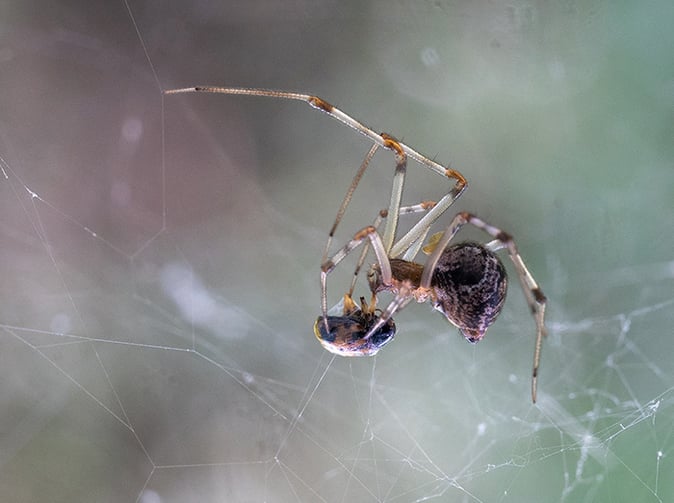How To Scorpion-Proof Your Phoenix Home
It's nice living in Phoenix: warm weather, desert beauty, lots of sunny days. But there is a downside. We have to put up with desert pests, like scorpions. As you are probably aware, scorpions are more than just a nuisance. A sting from one of these creepy arachnids, particularly an Arizona bark scorpion, is a safety concern. Fortunately, there are ways to reduce the number of scorpions in your yard and keep them from entering your home. Join us as we look at common scorpions in the Phoenix area, why they come into your yard, some places they like to hide, how they find their way in, and what you can do about them.

Common types of scorpions in Phoenix
Let's begin by identifying the common scorpions you'll likely find crawling around in your yard. We'll start with the scorpion we all dread the most.
Arizona bark scorpions
Two to three inches in length, the Arizona bark scorpion is little to look at, but you shouldn't underestimate this pest. Experts say it is the most venomous scorpion in North America. Its venom packs a big punch, and it is a health concern, particularly for kids, seniors, and individuals with a compromised immune system.
Along with its potent venom, there are a few other factors to consider. The Arizona bark scorpion is pale yellow and hard to spot on light-colored surfaces. It can scale the exterior of structures like a tree, and its small size allows it to slip into the tiniest of cracks.
Desert hairy scorpions
This species is the largest in North America. One of these scorpions can grow up to six inches in length. Fortunately, it doesn't have the venom to match its size. While it is undoubtedly painful to get stung by a desert hairy scorpion, it is not considered medically dangerous. However, as with any stinging insect, those with an allergy to the venom are always at risk.
The primary issue with these scorpions is that they are big and hairy. Seeing one in your home is likely to give you a jump scare.
Striped-tail scorpion
This scorpion species is less common than the other two, but it is still one to watch for on your property. You can identify it by the stripes on its tail. Its venom is comparable to the desert hairy scorpion. It is painful but not a medical threat for most people. You'll find these scorpions hiding in rarely visited areas, like a storage shed.
Why do scorpions come into your yard?
If you're hoping to scorpion-proof your home, you must know how to reduce the number of scorpions crawling near your home. Why do scorpions come into your yard? There are only a few factors that motivate them.
A scorpion is drawn to sources of moisture. Scorpions may move in if you have a damaged sprinkler, overwatered plants, containers that capture rainwater, wet towels next to the pool, or some other condition that provides moisture. Remove water and reduce moisture to deter scorpion activity.
A scorpion likes to hide in shaded locations. If you have low-lying vegetation, densely packed landscape areas, organic debris, stacked cardboard, or other hiding places, they will attract scorpions. Trim vegetation and remove clutter to deter scorpions and keep them away from your exterior.
A scorpion is always on the hunt for a meal. A yard with lots of pests is a hunting ground for scorpions. There are many ways you can naturally reduce the number of pests on your property on your own—or you could get a year-round pest control service plan. Fewer pests will result in fewer scorpions.
Do you have scorpions in your yard?
Look low and high when searching for signs of scorpion activity in your yard. Most scorpions stay near the ground, but some, like bark scorpions, hide in aboveground voids. Perform your search at night because that is when scorpions are most active. Bring a portable black light with you. Scorpions are biofluorescent. They glow when exposed to UV light.
Why do scorpions get into your house?
The simple answer is scorpions get into your house because they can. Here are a few specific examples of how they do it.
- A scorpion slides underneath objects to find places to hide. It only makes sense for a scorpion to slide right underneath a door if there is no sweep or the sweep is damaged.
- A bark scorpion gets underneath bark, so it feels natural to slide under building materials. When it slips through gaps around windows and doors, it can find pathways to get inside.
- A scorpion likes to squeeze into tight spaces. Sometimes, it gets into an item left outdoors and hitches a ride inside.
The more scorpions you have around your home, the greater the chances are that one of them will find its way to the interior of your home.
What can you do to scorpion-proof your home?
Step one is to remove attractants in your yard, like pest populations and moisture sources.
Along with reducing the number of scorpions near the exterior of your home, you need to seal potential entry points. You can do this on your own or with the help of a licensed pest control service provider.
Professional scorpion prevention from Titan
If you're in Anthem, Cave Creek, or elsewhere in the Phoenix area, let Titan Pest Control help. Our Desert Guard is perfect for addressing desert pests. We know what is needed to keep scorpions away and to prevent them from getting inside. Check out our Desert Guard overview page, or reach out and connect with us today.
Testimonials

Request Your FREE Estimate
Have questions or need help getting rid of pests? Simply complete the form below or give us a call!
Check Out Our Services
Titan Pest Control provides pest control services in the Phoenix-metro and Maricopa County, AZ. We promise personalized service and state-of-the-art techniques for all your exterminating needs.


